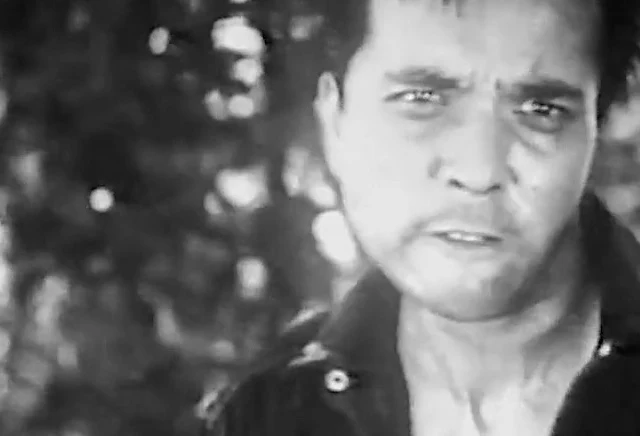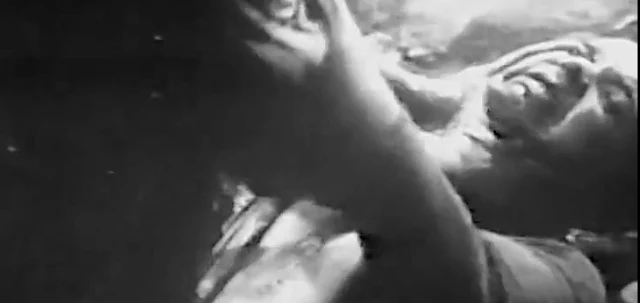Precious little has been written online or on print about Manuel Conde save a book by Nicanor Tiongson (which I haven't been able to read, unfortunately, and is currently unavailable). The filmmaker is best known for his comic Juan Tamad (Lazy John) film series, and for writing producing starring in and directing a smallscale biopic on Genghis Khan that depicted the eponymous Mongol prince as an ambitious, charmingly inventive runt--the film competed in the 1952 Venice International Film Festival, the first ever Filipino film to do so.
Venganza (Vengeance, 1958) which Mike de Leon has made available on his Vimeo website (sans subtitles, alas) isn't as well-known and isn't the Conde we are familiar with: a straightforward drama about peaceful Simoun's (Mario Montenegro) vow of retribution when bandits led by Martinico (Eusebio Gomez) and Peklat (Scar, played by the always memorable Joseph Cordova) terrorize his village and cause the death of his newly wedded bride Pilar (Perla Bautista).
Martinico is the ostensible villain and a rotten dastard to the core but Simoun's true adversary in my book is the officiating priest (and Pilar's brother), Padre Roman (Carlos Padilla Jr.). As the village's religious leader Roman is a force to reckon with; the folk bow and defer to his judgment and while he couldn't keep the bandits from raiding Simoun's wedding he does manage to check the bandits' (and Simoun's) more violent instincts.
Padre Roman can't stop the worst from happening but that doesn't stop him from attempting to stop worse from happening: when Simoun takes on the dark portentous glower that is apparently the Montenegro trademark (we saw that same expressive wrath in Lamberto Avellana's earlier Lapu-Lapu) he doesn't hesitate to remind Simoun that only God has the right to mete out punishment; later when they meet again Roman condemns Simoun's intention of using Martinico's new bride against the bandit, recruiting an entire village of Igorots to help in his scheme. Roman is that common figure in Filipino films the indomitable parish priest, striding through many a Filipino melodrama insisting on the infallibility of the Roman Catholic Church, on occasion (not often) pausing to help the protagonist in some small way. Maybe one of the more interesting variations I've seen was in Avellana's Anak Dalita, where Vic Silayan's Father Fidel plays a more ambivalent role, working both sides of the aisle hero and villain alike, deftly prevaricating on moral issues.
Here Roman stands firmly on the side of God with regards to vengeance, and comes off as dull, self-righteous. You wonder if the effect isn't deliberate: Simoun's bloodthirst is so much more compelling not to mention sexy that you tend to tune Roman out (so does Simoun, who at this point can't really hear much beyond the pulsebeat in his ear); later when Simoun is further along his plot and we see his treatment of the aforementioned bride (cold if not downright sinister), Roman's words feel more reasonable and we're readier to listen. The two men represent familiar tropes in the standard-issue revenge drama; what I think Conde brings to the genre is an evolving, surprisingly nuanced (if ultimately conventional) view of both men and their positions.
Conde directs with assurance and grace; like Avellana he keeps a tight rein on his camera, bringing out his visual virtuosity only when called for. The wedding party from the bandits' entry to their ultimate demands is a marvel of escalating tension: Peklat points his gun at the band and demand they play tango, and from the musicians' reluctance and the villagers' shocked expressions you know this is a genuinely scandalous moment (even if nowadays when Al Pacino steps blindly to the music he wins an Oscar); Peklat later delivers a satirical speech (a parody of hurt feelings, because the villagers hadn't invited them to the party) and watching the tense glances between Simoun, Ramon, and Pilar, you know they know how much danger they're in. Later we see Simoun standing by the grave with a black band round his left arm; the camera pans down to his shoes, dissolves to later, and we see the same shoes and armband, only Simoun is seated. Time has passed and Simoun out of exhaustion has taken the weight off his feet but little else has changed: he still mourns Pilar, still wants to exact bloody justice.
A pause to mull over Pilar's fate: how in '50s Filipino society rape is considered the worst possible fate, and how suicide is deemed the only honorable way out; if Pilar had done the sensible thing and allowed herself to be carried away, would Simoun be gunning for her instead of Martinico? I know John Ford explored this very theme in one of his best works (with John Wayne in the Simoun role) some two years earlier; Conde shies away from the topic, focusing strictly on the man's point of view--a pity, but there it is.
Simoun stalks Peklat, who leads a band of men delivering Martinico's bride; when the former improvises a delayed-action device and sets it off the bride's head jerks up at the camera and we see--for the first time--the visage of Carmencita Abad, startlingly beautiful, faintly Chinese (we never really notice Conde concealing her face because the director never makes a big deal of it; the reveal is a nice shock effect).
Another pause to mull over Abad's apparently hapless Belen: yes she's treated as a pawn in a game between Simoun and Martinico, yes the overall treatment of women here is far from progressive, but even in these antediluvian circumstances one might admire aspects of her character. Belen may be have made the mistake of choosing to become a bandit's bride, but she does on occasion show good instincts: escorted by Simoun she senses the innate decency of the man and opens up to him. Later when she learns her true status (hostage) she shrinks from him in fear but listens to other folks' assessment of the man: they say he's honorable and honest and since they treat her well and she has come to trust them, she reasons that there must be something to their regard. Of all the characters--Simoun, Martinico, Peklat, Roman, Pilar--only she displays any desire to change, any desire to bring about a better world. When she finally runs up a hill back to Simoun--a sequence accompanied by strummed strings, like Anton Karas' zither introduction of Harry Lime in The Third Man--she stops before him to say: "My name is Belen," and the moment is a genuine thrill: for the first time it seems we've come to truly know someone in this film, and only because she insists on identifying herself.
When Martinico has his enemies bound and helpless around him Simoun deftly uses the one subject he's familiar with--a man's thirst for revenge--to force a one-on-one duel with the bandit leader, a genuinely tense confrontation using itaks, or short swords with blades weighted at one end designed to lop off tree branches or human limbs (Gomez swings his in wide circles like a helicopter blade; Montenegro keeps his pointed matter-of-factedly forward; Conde employs medium shot and long takes, the better to see the action and the combatants' skill with blades).
Simoun's gambit is a clever comment on the tunnel-vision nature of vengeance--that a more mentally nimble opponent can use your single-mindedness against you--though of course Roman has to step in at the last minute to deliver the last word on the subject. A surprisingly engaging film, from a master Filipino filmmaker.
First published in Businessworld 5.8.20


No comments:
Post a Comment